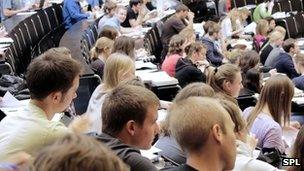Scottish independence: Students could be 'squeezed out' of home universities
- Published

Students in Scotland do not pay university fees
Scots students could be squeezed out of their home universities if there is a yes to independence and free tuition continues, experts have suggested.
Edinburgh University academics have been looking at higher education in an independent Scotland.
Currently, Scots and EU students pay no tuition fees at Scottish universities, while UK students pay annual fees.
In an independent Scotland rest of the UK students would be reclassified as EU students and free tuition would apply.
The Scottish government said it was committed to free education and that there would be a "range of options" to maintain the balance of students post-independence.
The research by Sheila Riddell, Elisabet Weedon and Sarah Minty is being funded by the Economic and Social Research Council.
In their briefing paper, titled The Funding of Higher Education in Scotland, the UK and Internationally, external, they suggest that funding education post independence would "represent a major challenge".
It said: "Clearly, free tuition in Scotland would be a major attraction for students from the UK and other EU member states.
"However, there would be a danger that such students could squeeze out Scottish domiciled students."
The authors have suggested that there would be a funding shortfall faced by the government of an independent Scotland.
But they propose three possible solutions.
They include;
Introducing fees for all students
Negotiating an agreement with the EU whereby quotas could be reserved for Scottish domiciled students
Introducing a separate admissions system for students from other EU countries, involving an administration fee and, possibly, a different admissions timescale. For example, EU students pay an annual student contribution charge of €2,500.
Currently, universities in England and Wales are allowed to charge up to £9,000 a year and in Northern Ireland, students pay £3,575.
At the moment, EU students study for free in Scotland but students from the rest of the UK are charged up to £9,000.
A Scottish government spokeswoman said: "No fees was the pledge we made, it is a pledge we have delivered on and this will not change with independence.
"A record number of students are now in higher education in Scotland.
"There are a range of options and mechanisms available to ministers to maintain the balance of students from within and outwith Scotland post-independence and ensure Scottish students continue to get the opportunities they need.
"We will publish specific plans in due course."
On the issue of the options, the report authors said: "With regard to option two, it appears that EU law might allow places to be reserved for Scottish students in subjects such as Education and Medicine, where there is a need to train students to undertake a particular job, but such arrangements would not apply to more general subjects.
"Option three, involving a different admissions process for students from EU member states, might be against the spirit of the Bologna Agreement."
A key element of the Bologna Agreement is the encouragement of student mobility, so that countries are not allowed to charge EU students more than the fees paid by home students.